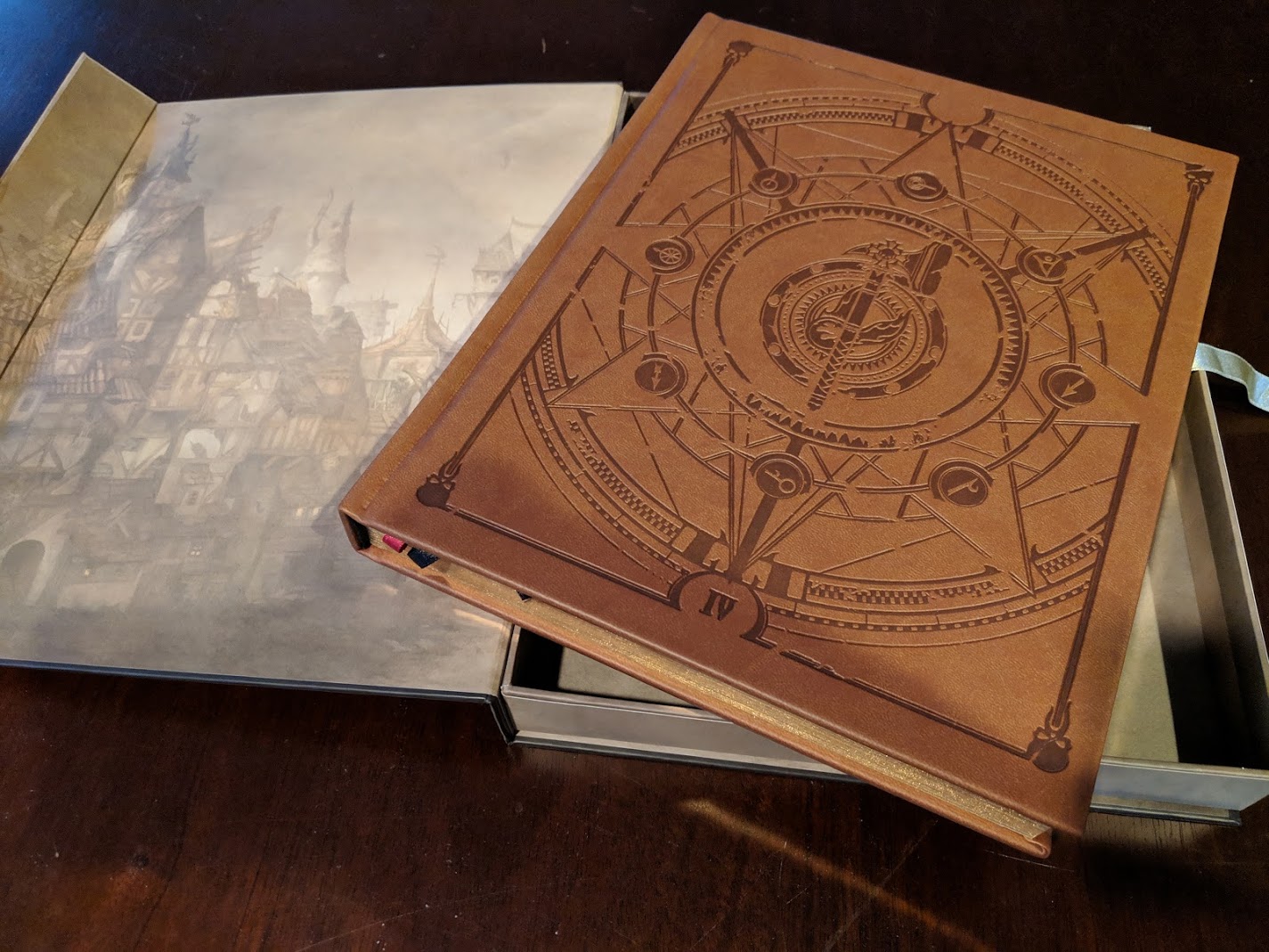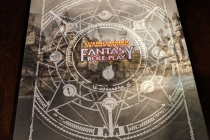
Every now and then I check the stats on my humble little blog to see which posts are striking a cord with my readers. Far and away the winner is the review I posted on various dungeon-crawl themed board games (I suspect due to it being indexed fairly high by Google). However no slouch is my post titled simply WFRP 4th Edition – Still Waiting. This was written back in July, two months after I pre-ordered the book and I was already feeling annoyed at the delays. Well, here it is now late December, and at long last my book has arrived.
Before I dive into my thoughts on the new edition, let’s see some glamor shots of the book itself. My copy arrived later than others because I sprung for the special “collector’s edition”, and I think it was worth it. If nothing else, this sure is one gorgeous book:
Given how long it’s taken for the book to arrive, and the fact that I’ve had the PDF for quite a while, I’ve already posted a couple times about some details on the game mechanics. But I don’t think I’ve given my high level thoughts about the game, and I thought it might be interesting to revisit a post I wrote where I laid out some of my gripes with the previous edition and see if the new one addresses them or not.
First off, let me say I really enjoy the new edition. It’s clearly an iteration of 2nd edition, which I already liked reasonably well. As we’ll see, it also clears up some issues I had with the mechanics, and manages to not introduce any new game-breaking changes. Sure, it’s got some weird and complex rules in it (see the linked discussions on combat above), but overall I just love how it feels. It feels, well, like Warhammer.
In my round up post I noted four specific gripes with 2nd edition. First, the fact that combat slows down as you level up. Well, 4th edition got rid of multiple attacks and parrying — thank goodness. Since every combat roll is an opposed roll, and the difference between the rolls is the damage, two high leveled characters will behave a lot like two low leveled characters. Since in both cases the combatants are going to get a similar number of success levels, who hits who will flip a lot and the damage numbers will generally be fairly low. When there’s a major power difference I’d expect the combat will end quickly as the high leveled combatant simply hits every time for large amounts of damage. Granted, I haven’t actually tested that scenario in game myself yet, so I may amend that opinion down the road. But at least the slog of tons of rolls at high levels is clearly gone.
Fate and fortune is still present in 4th edition – in fact they also added resolve and resilience, similar stats to fate and fortune that give the players points they can spend to overcome obstacles or bounce back when all looks dire. Ultimately I think I kind of like fate for campaign play, as it’s nice to have a mechanic to handle a character actually losing so badly they should be dead, but then add in a twist where they manage to somehow survive. Re-rolls is an annoying fact of the game though, and I think just one of the warts of Warhammer I’ll have to overlook.
My third gripe was that magic was simply too hard. Unfortunately in my short-lived campaign none of my players played a character with magical abilities, so I have yet to be able to form an opinion on the magic system in 4th edition. Hopefully that will come.
My final gripe (actually listed second in the original post but moved here for dramatic effect), was in the lack of follow through on careers. I remember this quite well both as a GM and player in 2nd edition, and I can even hear it happening the Warhammer podcast I’ve been listening to. The career system gives you this enticing tree of choices to make – will I advance to Captain and own a ship, or to Sergeant to be a highly skilled soldier? Unfortunately the narrative choices don’t always line up with the skills you feel you need, and collectively you end up with this bizarre collection of characters that really is impossible for the GM to reconcile. Sure, I can come up with why a charcoal burner and a rat catcher band together to go adventuring – they both have horrible jobs and are looking for any out they can find. But why would an inn keeper and a pirate captain take odd jobs or try to route out a chaos cult? Aren’t they worried about their inn and ship?
I mean, sure, the specific example I gave wasn’t great, we can all think of clever stories revolving around a pirate captain and an inn keeper. But multiply that by 4-6 players and it gets insane. Someone is going to end up asking “why does my character care about this?” Or be faced with picking a career that just doesn’t make sense to the story so far and kind of hand-waving it just so they can get the skills they want and keep playing with the current plot.
I think 4th does a reasonable job in addressing this by getting rid of the tree of interconnections between careers. Gone are the specific career exits and weird paths through careers. Instead, each career has four distinct levels with enough meat on it to fill out an entire campaign. You can start a rat catcher and remain a rat catcher through the whole game – you just become the most bad-ass rat catcher ever known. They double down on this by also not capping advances. If you want the best weapon skill of any player ever and you’re in a career that allows it to be advanced, you can sit there and spend every XP you ever get on that one stat.
Having not seen a long running campaign yet I don’t know how this will really play out, but my gut says this was a good change. I feel like decisions to switch career are going to be both more rare, and more guided by the demands of the campaign rather than simply in effort to keep leveling up your character.
So, how well did they address my gripes? Well, we have one no change, one definite improvement, one still untested, and one that feels promising but requires more research. I think I’d say that’s a solid effort. I’m really looking forward to playing this system more and posting my refined opinions.





